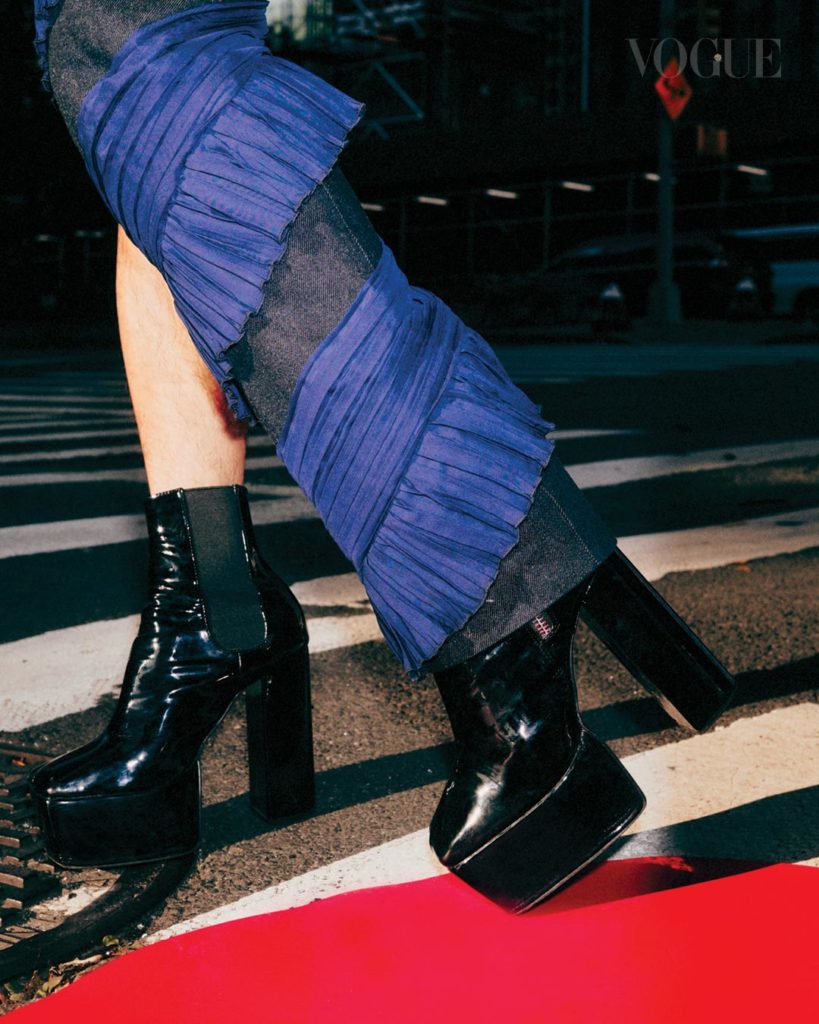To 31-year-old Shaobo Han, heels are a weapon of masc destruction. In the case of Syro, the New York City-founded footwear brand helmed by Han and their friend and business partner, Henry Bae, these words couldn’t ring more true. Seen on and championed by the likes of Bowen Yang, RuPaul, Sam Smith and Alok Menon, Syro’s ethos since its conception in 2016 has been simple: to bring the joy of wearing heels to people of all identities.
Borne out of the duo’s own journeys with fashion and self-expression, Syro boasts a size and style-inclusive line-up of shoes that range from a US men’s size 8 to 14. From the brand’s instantly recognisable five-and-a-half-inch metallic Rancho silver boots to a decidedly more muted counterpart dubbed Ami, Syro has found a niche in being unapologetic for everyday.

Today, the Brooklyn-based label is accompanied by a slogan that reads “femme footwear 4 everyone” and features a plethora of bold options, the most recent of which sees a customised hardware rendition for British fashion designer Charles Jeffrey. And while Syro undoubtedly continues to make waves in the design sphere, it’s clear that this is just the beginning. Here, Han lets us in on the importance of degendering footwear and the role its played in their life.
Tell us about the first time you remember putting on a pair of heels.
They were a lime green pair of flip-flop sandals with a three-inch stiletto. They were my mother’s and she was a shoe fanatic with an obsession for high heels. Maybe it was the colour, maybe it was the stiletto heel, but I was so drawn to it. Unfortunately, the first pair of heels I tried on was also the first pair of heels I broke. I must have only been 12 or 13. I still remember the horror when I heard the sound of the heel cracking as I was strutting down my mother’s bedroom.
Thank you for your work on degendering fashion. Why is this important to you?
I am a troublemaker and I aim to break the restrictive framework of gender norms and disrupt the comfort of heteronormativity. I’m always asking myself what I can do to take up more space for us queer individuals. The answer is to be as visible as possible. Visibility is a huge part of what we do at Syro. I really want to show that gender non-conforming individuals not only exist in the digital realm, but we are also real and complex human beings. Not only do we exist, but we are also thriving and celebrating each other.
Visibility is a huge part of what we do at Syro. I really want to show that gender non-conforming individuals not only exist in the digital realm, but we are also real and complex human beings.
How have you dealt with society’s reactions—good or bad?
I’m well aware that I am terrorising everyone with my gender. Fashion is completely political and my existence sends a clear message that queer people are not holding back anymore. I have sanitised my queerness for far too long. So yes, it can still be very dangerous for many of us to leave our house—but I put my need to be authentic above my own safety.
How have heels played a role in empowering you?
When I strut down the street in my heels, every part of my being feels right. Wearing heels allows me to connect with a part of myself that I was taught to be ashamed of. The moment I started to embrace my femininity was the moment I finally felt I belonged in my body. I felt free and unbothered and that was the moment I took control of who I am today.

If you could describe yourself as a pair of shoes, which ones would they be?
Six-inch knee-high platforms in black patent leather. I want to feel the power of my gender non-conformity.
What’s next?
The mood for this year is height and comfort. We are treading over difficult times.
Photography Alvin Kean Wong
Fashion Ali Claire Marino and Jasmine Ashvinkumar
Hair Takuya Yamaguchi/The Wall Group
Make-up Mitch Yoshida
Tailor Dee Serret
Photographer’s assistants Brian Hexter and Ramon Martinez
Stylist’s assistant Lui Russi
Location Café Studio NYC
For more stories like this, subscribe to the print edition of Vogue Singapore.





